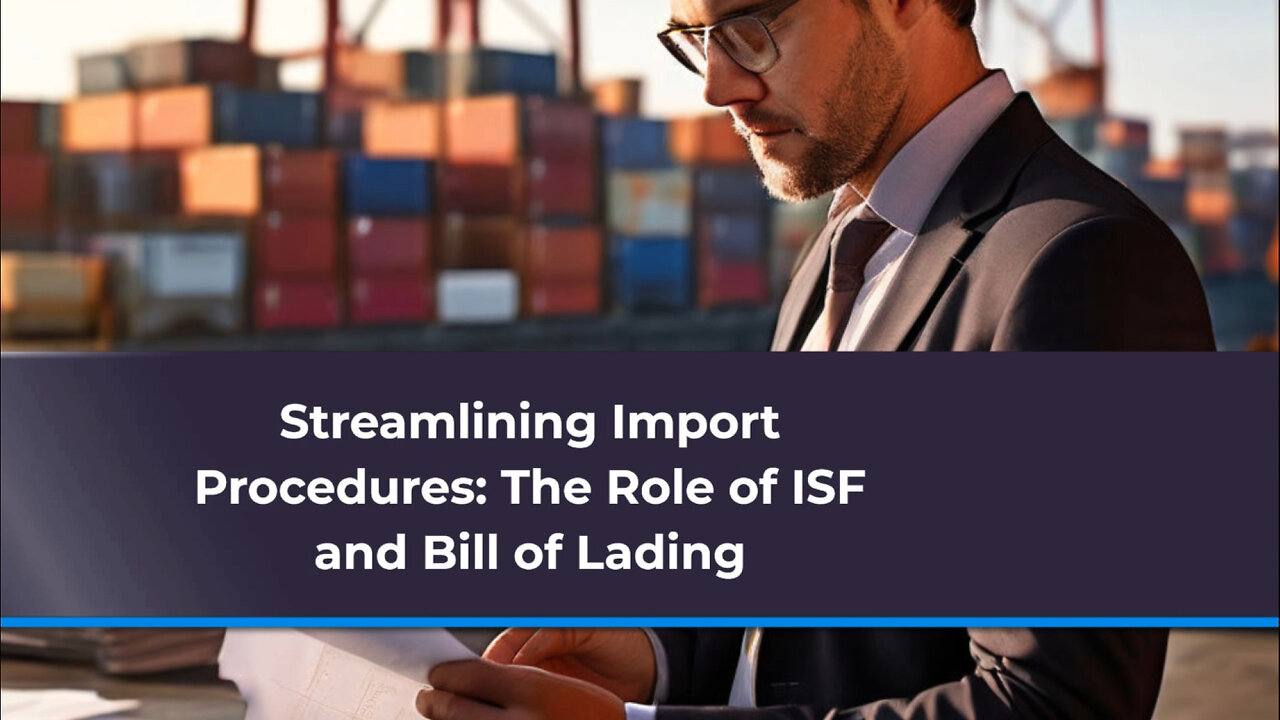Premium Only Content

The Secrets to Smooth Customs Clearance: ISF and Bill of Lading Demystified
ISF Depot // 661-246-8217 // customs@isfdepot.com // www.isfdepot.com
Customs brokerage plays a crucial role in facilitating the movement of goods across international borders. It involves various tasks such as preparing and submitting documentation, calculating tariffs and duties, and ensuring compliance with government regulations. Customs brokers act as intermediaries between importers and government authorities, making the importation process smoother and more efficient.
The Importer Security Filing (ISF), also known as the 10+2 rule, is a mandatory filing requirement introduced by the US Customs and Border Protection (CBP) in 2009. It applies to all ocean shipments entering the United States and aims to enhance cargo security and supply chain visibility. The ISF requires importers or their customs brokers to submit a comprehensive set of information about the imported goods before they are loaded onto a vessel bound for the US. This information includes details about the shipper, consignee, container stuffing location, and other data necessary for risk assessment.
The ISF plays a crucial role in facilitating the flow of goods through customs. By providing advance information, it allows Customs and Border Protection to assess the risk associated with each shipment before it even arrives at the port. This enables authorities to identify and address potential security threats more effectively. From an importer's perspective, complying with the ISF requirement can prevent costly delays and penalties. Non-compliance can lead to cargo holds, additional inspections, and fines. Therefore, it is essential for importers to work closely with their customs brokers to ensure timely and accurate filing of the ISF.
The Bill of Lading (B/L) is a critical document in the international shipping process. It serves as evidence of the contract of carriage between the shipper and the carrier and also acts as a receipt for the goods being transported. The B/L contains key information such as the names and addresses of the parties involved, a detailed description of the goods, and the terms and conditions of the shipment. Customs brokers and importers rely heavily on the information provided in the B/L to complete the customs clearance process. It helps determine the value, classification, and duty rates applicable to the imported goods.
Successful customs clearance requires a close collaboration between customs brokers and importers. Customs brokers use their expertise and knowledge of customs regulations to guide importers through the complex documentation process. They ensure that all required information is accurately provided, and deadlines are met. Importers, on the other hand, must provide customs brokers with complete and correct information about the imported goods. This collaboration ensures that the ISF and the Bill of Lading are prepared accurately, reducing the risk of delays or penalties.
In conclusion, understanding the role of the Importer Security Filing (ISF) and Bill of Lading is crucial for importers and customs brokers in the customs documentation process. Complying with the ISF requirements and providing accurate information in the Bill of Lading can help ensure smoother customs clearance and avoid unnecessary delays and penalties.
#usimportbond #isfcustomsbroker #uscustomsclearing #isfentry
Video Disclaimer Here: This tutorial is independent and not affiliated with any US governmental entities.
-
 3:29:42
3:29:42
BrookieMonster
11 hours ago $31.58 earnedChristmas Stream: Marvel Rivals with CallmeSeags 🎄
106K18 -
 LIVE
LIVE
TheSaf3Hav3n
3 days ago| RUMBLES FIRST SUBATHON IS HERE!!! | DAY 4 |
1,346 watching -
 3:14:33
3:14:33
Joe Donuts Gaming
13 hours ago🟢 Live : Christmas is Here!! | Fortnite, Caroling, Light Tours and Donos !!
50.2K13 -
 6:02:38
6:02:38
CLUJ
12 hours agoCHRISTMAS EVENING HYPE!! LETS HAVE FUN GAMING!!
48.5K7 -
![I AM FINALLY BACK :: PUBG: BATTLEGROUNDS :: RUMBLE NOW HAS GIFTED SUBS!!! [Merry Christmas] {18+}](https://1a-1791.com/video/fwe1/22/s8/1/e/f/C/6/efC6v.0kob-small-I-AM-FINALLY-BACK-PUBG-BATT.jpg) 9:57:19
9:57:19
a12cat34dog
14 hours agoI AM FINALLY BACK :: PUBG: BATTLEGROUNDS :: RUMBLE NOW HAS GIFTED SUBS!!! [Merry Christmas] {18+}
32.1K4 -
 3:55:42
3:55:42
STARM1X16
13 hours agoMerry Christmas Fortnite
102K11 -
 2:45:33
2:45:33
Sgtfinesse
13 hours agoMerry Christmas Night
77.3K19 -
 3:51:18
3:51:18
tacetmort3m
1 day ago🔴 LIVE - (MERRY CHRISTMAS) TIME TO SPREAD DEMOCRACY - HELLDIVERS 2 OMENS OF TYRANNY
45.3K2 -
 2:46
2:46
BIG NEM
16 hours agoDiscovering RAKIJA: The Holy Liquer of the Balkans
32.6K3 -
 1:11:38
1:11:38
Film Threat
21 hours agoCHRISTMAS DAY CHILL STREAM WITH CHRIS GORE | Hollywood on the Rocks
151K33